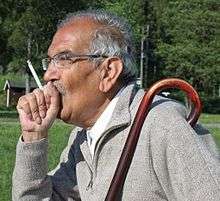Wasef Bakhtari
| Wasef Bakhtari واصف باختری | |
|---|---|
 | |
| Born |
1942 Balkh, Afghanistan |
| Citizenship | Afghanistan |
| Occupation | Professor, Poet, Writer, Linguist & Historian |
| Title | Ustad |
| Website | http://www.wasefbakhtari.com/ |
Wasef Bakhtari (Persian: استاد واصف باختری) (born 1942 in Balkh, Afghanistan) is a Persian poet, literary figure and intellectual.
Life and education
Even though his father was from Kabul, he spent most of his childhood in Mazar-i-Sharif. He attended Bakhtar School for his primary and for most of his secondary education. After his family moved to Kabul he finished Habibia High School in 1965. Wasef Bakhtari holds a BA degree in Persian literature from Kabul University. He did his graduate studies in the U.S. and received a master's degree in education from Columbia University in 1976. In 1996 Bakhtari, then a professor of literature at Kabul University, and his wife Noriajan were forced to flee Afghanistan because of the intolerance of the Taliban. They sought refuge in Pakistan, but with a rise in Taliban influence there as well, returned to the United States with the help of World Relief and the United Nations High Commission for Refugees, which resettled them in New Port Richey, Florida.[1]
Work life
For 15 years Bakhtari worked for the Ministry of Education, writing and translating text books. In 1978 he became the editor in chief of Zhwandoon Magazine. He has also served as a professor at Kabul University and influenced many other Persian writers and poet in Afghanistan.
Political life
Wasef Bakhtari was one of the founders and leaders of the leftist and Maoist party, Shole Jawed. In 1978, when the Khalqi government took power he was thrown into prison for two years. He left politics after he was freed in 1980.
Poetry and literature
Wasef Bakhtari is one of the most noted modern Persian poets and writers in Afghanistan. He is regarded as a literary leader to most Persian writers, poets, and linguists in Afghanistan. He was one of the first Persian poets to introduce she’r-e nimaa'i ("Nimaic poetry") and he is regarded in having his own style of Persian poetry. He was under the influence of Rahi Moayeri, Amiri Firoozkouhi and Ahmad Shamlou.[2]
References
- ↑ Lush, Tamara. "Afghani refugee expresses same horror as Americans". St. Petersburg Times Online. September 14, 2001. (Retrieved November 1, 2006).
- ↑ WWW.Afghanasamai.com